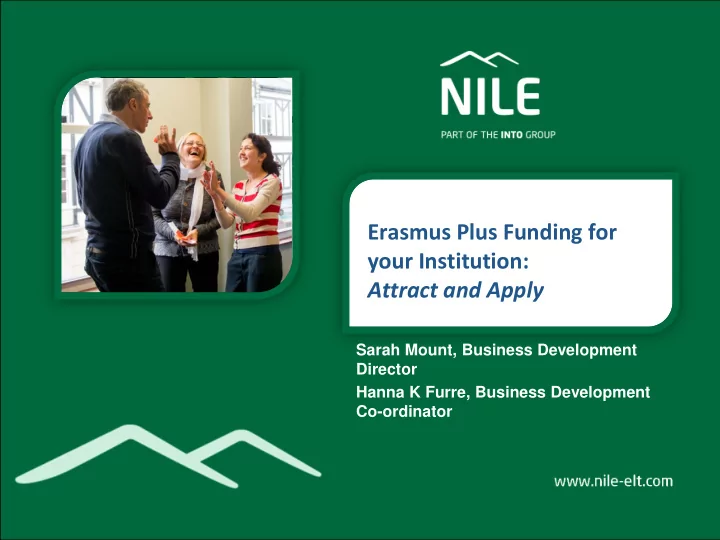

Erasmus Plus Funding for your Institution: Attract and Apply Sarah Mount, Business Development Director Hanna K Furre, Business Development Co-ordinator
What is Erasmus Plus? Erasmus plus funding hopes to improve opportunities by ‘…providing support for schools and training organisations, so that they are able to address new phenomena such as the internationalisation of education and the growing use of digital learning, and create flexible learning pathways in line with learners needs and objectives’.’ Erasmus + Programme Guide 2015 www.nile-elt.com
Some facts • Total budget of € 14.7 billion over 7 years • Some 56 countries (EU & neighbouring countries) are eligible to apply • Grants available for 4 million people, 125,000 institutions • 40 % increase in funding available under the previous ‘Lifelong Learning Programme ’. • What does this mean? 800,000 educators and youth workers will acquire new teaching and learning methods abroad www.nile-elt.com
European Funding post 2014 Main differences: Main differences: • Institutional V personal applications • Applications for whole training programme V single training activity • Development plan for increased competences (European dimension) V individual CPD www.nile-elt.com
The Application Process A step-by-step Plan: • Identify: training needed • Research: formal application requirements • Investigate: training opportunities available • Plan: European Development Plan www.nile-elt.com
Example Application Form www.nile-elt.com/funding www.nile-elt.com
European Development Plan What is a European Development Plan? • What is you wider goal? (Where are you now?) • How are you going to reach this goal? (Where do you want to get to)? • Who do you need to help you reach this goal (How are you going to get there?) When referring to your EDP - Be specific, use examples www.nile-elt.com
Main Activities How do the different parts of your project fit into your European Development Plan/School strategy? Example • Goal – Increasing CLIL competencies 1. Job-shadowing at a partner school to increase knowledge 2. CLIL for secondary teachers TT course 3. Language improvement course for teachers www.nile-elt.com
Follow-up Dissemination Evaluation Don’t underestimate the importance of this step ! www.nile-elt.com
Keys to Sucess Feasibility and Impact Show links/relationships between: Needs and requirements; planned activities; expected outcomes AND long-term effects/dissemination International Dimension, Networking & Learning from Colleagues Why transnational mobility is key to the impact of the project www.nile-elt.com
SMART S Specific M Measurable A Achievable R Realistic T Timebound www.nile-elt.com
Success stories – Open-enrolment course M Rapisardi Paterno school, Sicily 1) Context: • Setting up European network of Sicilian schools • Offer language courses and CLIL • Insufficient English level of teachers and management 2) Objective and participant profile • Strengthen professional profile of management staff • Train prospective CLIL staff 3) 2 week courses for all three groups www.nile-elt.com
NILE Experiences 4) Methodology: • Accredited schools, • Project group, • Europass 5) Results and Impact: • Improving competences of management staff • Implementing CLIL • Promoting materials sharing through webpage and other channels 6) Long Term benefits: • School as reference pint in the internationalisation process • Using the school as a resource in non-school projects www.nile-elt.com
Success stories – Tailor-made course Instituto Comprehensivo Assissi Project: ‘Global Education 2020’ Identified the need for a course combining language improvement, CLIL and innovative uses of technology in the classroom. • Needs analysis • Programme negotiation/differentiation • Learner outcomes www.nile-elt/funding www.nile-elt.com
Summary A step-by-step Plan: • Identify: training needed • Research: formal application requirements • Investigate: training opportunities available • Plan: European Development Plan – Does your project take you from A to B? www.nile-elt.com
You have been watching… Please feel free to contact us with any further questions. sarah@nile-elt.com hanna@nile-elt.com www.nile-elt.com
Recommend
More recommend